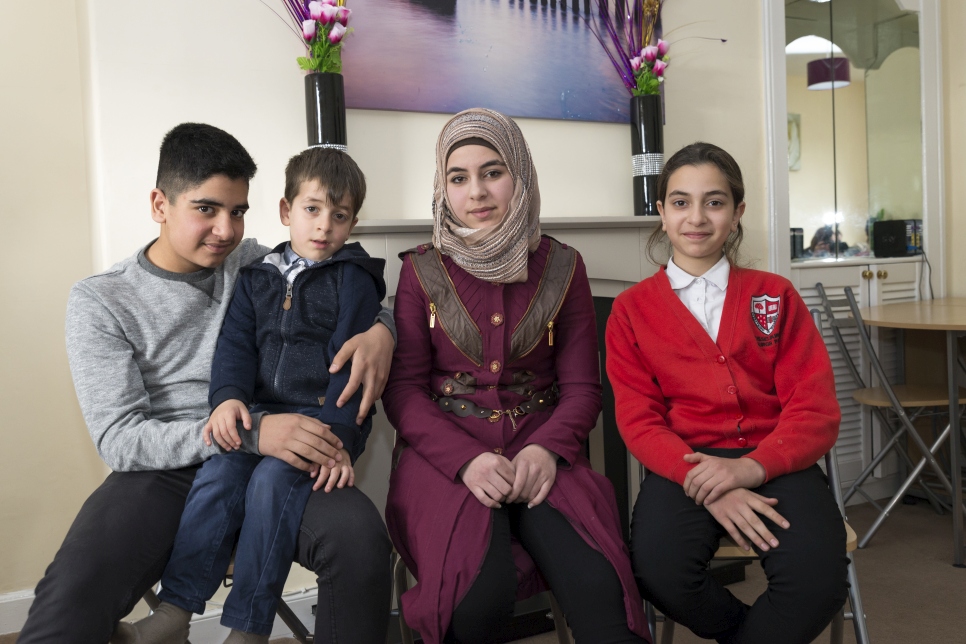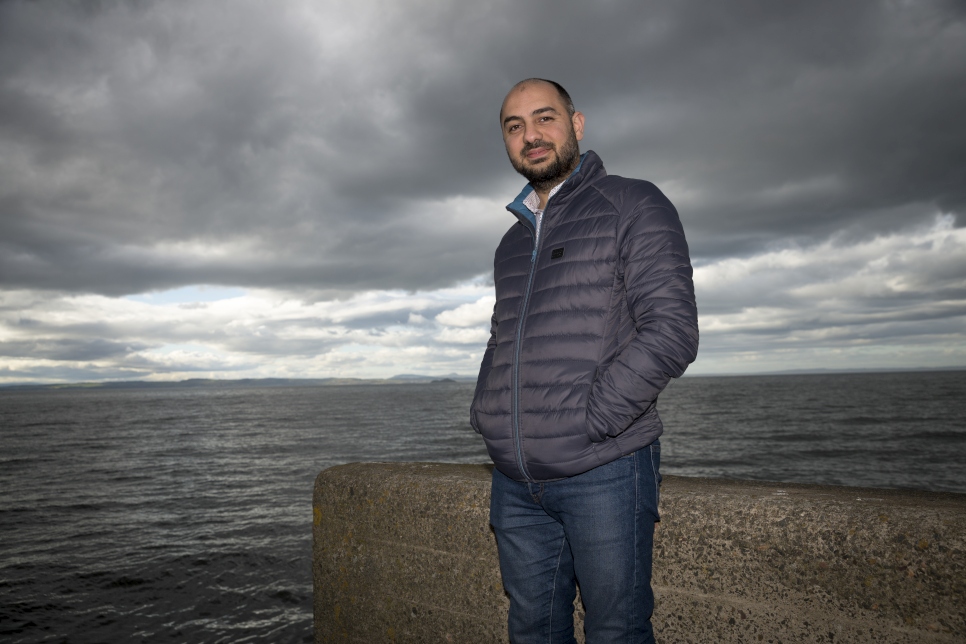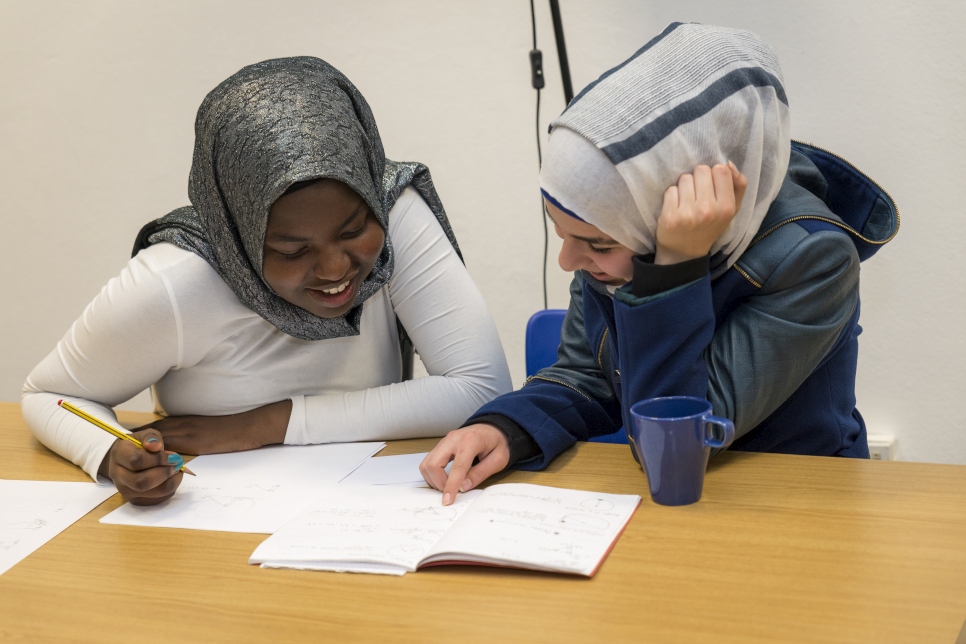Teen Spirit: Edinburgh students help Syrian refugees to integrate
University students ally with Chaplain to provide a helping hand to disorientated teenagers, who fled civil war.

The Al Dabbas siblings (left-to-right), Malek, 14, Yamen, 5, Israa, 16, and Shaimaa, 11, at their new home in Musselburgh, near Edinburgh. © UNHCR/Claire Thomas
EDINBURGH // When Israa Al Dabbas first came to Musselburgh, a town just outside Edinburgh, she hardly spoke any English and knew nothing about Scotland.
Just weeks after arriving in early 2016 from the outskirts of Damascus, Syria, by way of Lebanon, the then 15-year-old started school. “I was confused and nervous,” she said in the apartment that she shares with her mother and three siblings, just five minutes’ walk from her new school.
“Confused” and “nervous” are common emotions for teenagers. Throw in forced displacement, the loss of a father to conflict and adjusting to a new culture and language, and it is easy to see why a pilot scheme at Edinburgh University has identified Syrian teenage refugees as particularly needy.
Civic and voluntary groups in Britain have shown huge interest in working with resettled refugees. The Government recently initiated its Community Sponsership Scheme, which remains nascent. When expanded, it will help individuals and groups like churches, charities and businesses to more directly support resettlement and integration by assisting with housing, access to language classes, employment and medical services for vulnerable refugees. Before that takes root, pilots like the Edinburgh project are helping to fill the gap.
In the Scottish capital, a weekly session launched in January brings together newly arrived Syrian refugee teenagers from the local area for two-hour tutoring with university students. The sessions include games, language lessons and tutoring on subjects the teenagers need help with, as well as occasional local outings.
“We saw nothing for teenagers,” said Amer Masri, one of two originators of the idea and an alumnus of Edinburgh University’s School of Biology, who now works as a post-doctoral researcher on campus. “There are language lessons for adults, and mother and toddler groups. But teenagers were neglected -- and this is a very sensitive age.”

Dr Amer Masri, who originated the pilot tutoring scheme with fellow Edinburgh University alumnus Nadin Akta, stands at the end of Fisherrow Harbour near the town of Mussleburgh © UNHCR/Claire Thomas
Israa’s thoughts would drift in class, perhaps reflecting on the fighting she had witnessed before fleeing Syria, or the shelling that took her father’s life. While fellow pupils were “very friendly,” she said, language barriers kept her and her brother Malek, 14, at the same school, from forming friendships.
As the only girl in school to cover her hair, she also invited curious glances. She and Malek began taking their lunch alone, away from the canteen.
“I noticed how Israa and Malek were isolated,” said Nadin Akta, the Dabbas family’s Musselburgh council-appointed English teacher. Their mother, Ramia, also voiced concerns.
Alongside Masri, the researcher, Akta began exploring how to help newly-arrived teenagers keep up in school and avoid isolatation.
Their timing could not have been better. In late 2016, Reverend Ali Newell, the Associate Chaplain at Edinburgh University, was striving to broaden the university’s outreach to the city’s new arrivals.
“We’d been speaking about the plight of refugees as part of our work at the chaplaincy,” Rev Newell said. “Students had come up to me and said, ‘I’ve got to do something.’ So we were trying to find the right thing for students to do, and we’d been thinking about the Syrian community.”

Reverend Ali Newell, Chaplain of Edinburgh University was instrumental in kickstarting the tutoring pilot scheme, which takes place at her chaplaincy on campus. © UNHCR/Claire Thomas
Masri mentioned his concerns about Syrian teenagers to Rev. Newell and suggested Edinburgh University students might volunteer as tutors. “It just clicked,” Rev Newell said. “There’s a million things going on, but nothing for teenagers, and it’s perfect for our students.” From there, things gathered pace.
“Students had come up to me and said, ‘I’ve got to do something.’"
Both from Syria, Masri and Akta came to Edinburgh separately as students seeking refuge after Syria’s conflict started in 2011. They watched the city’s tiny Syrian community expand as the UK Government’s Vulnerable Persons Resettlement Scheme, implemented with UNHCR, the UN Refugee Agency, began in earnest in late 2015.
And they made themselves available.
They knew most of the new arrivals and were able to contact families with teenagers to float their idea.
Meanwhile, Rev. Newell contacted students she knew who were keen to help, notably Hannah Markay, 22, and Estifa’a Zaid, 21. “We were wondering, where’s the need?” said Markay, an undergraduate. After they met with Masri and Rev. Newell, “it seemed so obvious,” she added.
They, in turn, sought out fellow students in the Islamic Society, and Arabic speakers in the Islamic and Middle Eastern Studies Department.

Israa Al Dabbas (right), 16, originally from Ghouta near Damascus, receives tuition from volunteer student Estifa'a Zaidat, at Edinburgh University. © UNHCR/Claire Thomas
“The response was so beautiful,” said Zaid, a physics student. “Just to see the amount of emails we got, offering help. We had too many people, so we had to turn quite a few tutors away.”
In January, less than three months after Masri and Akta had first discussed the idea, the initial session of the Teenage Syrian Refugee Tutoring pilot project was held at Edinburgh University’s Chaplaincy in the city centre. It has continued there almost every Friday since.
“The response was so beautiful”
With 14 teenagers now enrolled, Masri believes that the programme covers every Syrian teenage refugee in the city and some, like Israa and Malek, from nearby. There has been an issue around transportation for those in more distant areas, and Amir hopes to address this should the project go from “pilot” to officially sanctioned by the university.
So far, all involved say the programme has been a success.
Markay and Zaid, the tutors, said the improvement in the teenagers’ confidence had been one the main achievements.
“We’re very proud,” said Masri. “And we’ll be prouder in the future when we see them graduating from the university.”
Israa, meantime, said she is no longer so distracted in class. Israa and her brother are beginning to form friendships with fellow Syrian teenagers from the programme, as well as classmates in Musselburgh.
And recently, they decided to return to the canteen to eat their lunch with the other kids.
This story is part of a series exploring the ways people across the UK are showing refugees and asylum-seekers a #GreatBritishWelcome.
